What People Are Commenting
Protestant Carols &
Saying Grace at the Table
Saying Grace at the Table
Hello,
I’m reading Dr. Horvat’s delightful book Catholic Manual of Civility. What a great course in true and noble manners.
What does Dr. Horvat recommend for how to handle saying grace before and after meals in these situations:
Sincerely,
D.C.
Dr. Horvat responds:
Hello D.C.,
Thank you for your kind words about my book.
To answer your questions, let me suppose that you have the holidays at home and your business lunches are at restaurants or clubs away from home.
1. At your home, my first suggestion is to acquire the custom - common in countries of Catholic formation - to have only one person say the grace before and after meals. Let us end with our democratic way of saying grace where each person competes in an escalating chorus of voices. Let us leave it to be said by the most important person at the table: normally the father; in his absence, the mother; then, the eldest son etc.
This is a more hierarchical way of saying grace, which has less tone of the progressivist “dialogue” that has invaded everything today, even our Masses. The prayer said by only one person facilitates the recollection of all and brings our attention more to God than to other persons.
When this habit has been established in your home, most of the problems of “sharing” the saying of grace ends when you receive non-Catholic relatives. You can simply say: “It is our custom to have only the head of the family say the grace.”
The perfect solution would be for the head of family to say the grace before and after meals in Latin, a language that the average Protestants do not know. (For the prayers in Latin, click here)
Until you reach the point of making these two improvements in your home - only one person says the grace and recites it in Latin - you can tell your guests that it is the custom in your home to say the grace quietly. If a Protestant tries to impose saying a prayer aloud, let him do so, remain standing and then say yours quietly. You should prepare your wife and children for this eventuality, instructing them to cross themselves and pray before being seated, and then not participate in any Protestant prayer.
2. If you are in restaurants or clubs, I believe the simple solution is to say the grace quietly before and after your meal. Cross yourself and say your prayers quietly while standing before you sit to eat your meal. At the end of the meal, stand, cross yourself, and silently say your after-meal prayer. This is the normal way that Catholic businessmen pray in restaurants before and after meals in many Catholic countries.
I hope this is of some help to you.
Cordially,
Marian T. Horvat, Ph.D.
I’m reading Dr. Horvat’s delightful book Catholic Manual of Civility. What a great course in true and noble manners.
What does Dr. Horvat recommend for how to handle saying grace before and after meals in these situations:
- Holidays with non-Catholic relatives?
- Business lunches or dinners with non-Catholics?
Sincerely,
D.C.
______________________
Dr. Horvat responds:
Hello D.C.,
Thank you for your kind words about my book.
To answer your questions, let me suppose that you have the holidays at home and your business lunches are at restaurants or clubs away from home.
1. At your home, my first suggestion is to acquire the custom - common in countries of Catholic formation - to have only one person say the grace before and after meals. Let us end with our democratic way of saying grace where each person competes in an escalating chorus of voices. Let us leave it to be said by the most important person at the table: normally the father; in his absence, the mother; then, the eldest son etc.
This is a more hierarchical way of saying grace, which has less tone of the progressivist “dialogue” that has invaded everything today, even our Masses. The prayer said by only one person facilitates the recollection of all and brings our attention more to God than to other persons.
When this habit has been established in your home, most of the problems of “sharing” the saying of grace ends when you receive non-Catholic relatives. You can simply say: “It is our custom to have only the head of the family say the grace.”
The perfect solution would be for the head of family to say the grace before and after meals in Latin, a language that the average Protestants do not know. (For the prayers in Latin, click here)
Until you reach the point of making these two improvements in your home - only one person says the grace and recites it in Latin - you can tell your guests that it is the custom in your home to say the grace quietly. If a Protestant tries to impose saying a prayer aloud, let him do so, remain standing and then say yours quietly. You should prepare your wife and children for this eventuality, instructing them to cross themselves and pray before being seated, and then not participate in any Protestant prayer.
2. If you are in restaurants or clubs, I believe the simple solution is to say the grace quietly before and after your meal. Cross yourself and say your prayers quietly while standing before you sit to eat your meal. At the end of the meal, stand, cross yourself, and silently say your after-meal prayer. This is the normal way that Catholic businessmen pray in restaurants before and after meals in many Catholic countries.
I hope this is of some help to you.
Cordially,
Marian T. Horvat, Ph.D.
______________________
A Disaster Called Francis
TIA,
Since the Pope's remarks about not being obsessed with abortion, homosexuality etc, I have heard that a number of fallen away Catholics are thinking of “coming back to the Church” since it now fits with their lukewarm sense of morality! It is a sad state when the ENEMIES OF THE CHURCH APPLAUD YOU!!
True traditional Catholics had better batten down the hatches. The storm is just beginning! This Pope is a disaster!
K.D.
Since the Pope's remarks about not being obsessed with abortion, homosexuality etc, I have heard that a number of fallen away Catholics are thinking of “coming back to the Church” since it now fits with their lukewarm sense of morality! It is a sad state when the ENEMIES OF THE CHURCH APPLAUD YOU!!
True traditional Catholics had better batten down the hatches. The storm is just beginning! This Pope is a disaster!
K.D.
______________________
A Family Holyday
TIA,
A thought occurred to me so, as usual, I 'd like to share it. I think it's a nice idea for every Catholic Family to have a 'Family Holyday.' One special day set aside each year for saying special prayers or Rosaries or going to Mass if possible.
This 'chosen' day can be in remembrance of a deceased family member or any momentous event that effected the family. So, although this date has just recently passed, I designate the date that C. died, August 23rd, as the S. Family Annual Holyday.
I hope this survives many generations.
S.S.
A thought occurred to me so, as usual, I 'd like to share it. I think it's a nice idea for every Catholic Family to have a 'Family Holyday.' One special day set aside each year for saying special prayers or Rosaries or going to Mass if possible.
This 'chosen' day can be in remembrance of a deceased family member or any momentous event that effected the family. So, although this date has just recently passed, I designate the date that C. died, August 23rd, as the S. Family Annual Holyday.
I hope this survives many generations.
S.S.
______________________
Timely Quotes of Pope St. Pius X
TIA,
Here are some quotes I transcribe from Pascendi by St. Pius X. These are quotes on modernists that apply perfectly to the progressivists who took over the Church, not excluding the last Popes, principally Francis I.
S.G.
“The partisans of error are to be sought not only amongst the Church's open enemies; but...in her very bosom, and are the more mischievous the less they keep in the open.”
“The Church has no greater enemies. For they put into operation their designs for her undoing, not from without but from within. Hence, the danger is present almost in the very veins and heart of the Church, whose injury is the more certain from the very fact that their knowledge of her is more intimate.”
“They seize upon professorships in the seminaries and universities, and gradually make of them chairs of pestilence.”
“Certainly we don't expect to find men dressed in sheepskin. No. What we are told to ‘beware’ of is that which on the surface sounds pleasing to the ear; that which seems ‘positive’ or ‘beneficial’ at first glance. But behind it all is a subtle error that destroys Faith. What is one of the best ways that an error against the Faith can be taught to a Catholic and have him easily accept it as true even if it at first they question the novelty of it? The way it was done at the turn of the century was to say that ‘doctrine evolves,’ or that ‘truth evolves with man.’ Today, however, being that evolution is not generally looked upon favorably by Catholics, they will instead say that you must realize that there is ‘doctrinal development’ - this is the ‘sheep's clothing’ of which Our Lord speaks.”
(Encyclical Pascendi Dominici gregis of Pope St Pius X)
Here are some quotes I transcribe from Pascendi by St. Pius X. These are quotes on modernists that apply perfectly to the progressivists who took over the Church, not excluding the last Popes, principally Francis I.
S.G.
“The partisans of error are to be sought not only amongst the Church's open enemies; but...in her very bosom, and are the more mischievous the less they keep in the open.”
“The Church has no greater enemies. For they put into operation their designs for her undoing, not from without but from within. Hence, the danger is present almost in the very veins and heart of the Church, whose injury is the more certain from the very fact that their knowledge of her is more intimate.”
“They seize upon professorships in the seminaries and universities, and gradually make of them chairs of pestilence.”
“Certainly we don't expect to find men dressed in sheepskin. No. What we are told to ‘beware’ of is that which on the surface sounds pleasing to the ear; that which seems ‘positive’ or ‘beneficial’ at first glance. But behind it all is a subtle error that destroys Faith. What is one of the best ways that an error against the Faith can be taught to a Catholic and have him easily accept it as true even if it at first they question the novelty of it? The way it was done at the turn of the century was to say that ‘doctrine evolves,’ or that ‘truth evolves with man.’ Today, however, being that evolution is not generally looked upon favorably by Catholics, they will instead say that you must realize that there is ‘doctrinal development’ - this is the ‘sheep's clothing’ of which Our Lord speaks.”
(Encyclical Pascendi Dominici gregis of Pope St Pius X)

Posted December 31, 2013
______________________
The opinions expressed in this section - What People Are Commenting - do not necessarily express those of TIA
______________________
______________________











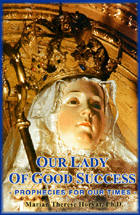

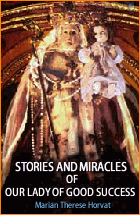
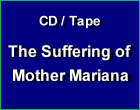
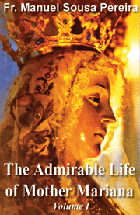
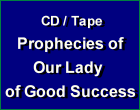
I have been researching and was unable to find anything about the history of Catholics singing Protestant Christmas hymns like Away in a Manger, Joy to the World, etc.
My Catholic sense tells me that this would never have been condoned by the Church prior to Vatican II, though some 1950s bishops here or there might have allowed it in their dioceses. Also, no pre-VII Catholic hymnal I’ve seen contains any Protestant carols.
Is there something I’m missing here? Am I right that a Catholic should not sing these songs? Do you have any documentation one way or the other that might help me out with this issue?
Thanks and God Bless you!
In Christ & Mary,
G.C.
TIA responds:
Dear G.C.,
We believe you are right on target. Catholics should neither sing Protestant carols nor any other songs coming from that source. The Catholic Church has inspired the richest possible hymnology for Christmas, and we do not need to make concessions to Protestantism by singing its tunes.
As a rule the Protestant carols concealed the existence of original sin and, consequently, the role of Our Lord as Redeemer. By singing their tunes, we in some way give implicit adhesion to the same doctrinal omission.
It is a type of ecumenism that should be avoided. Unfortunately, in the U.S. these compromises were being made even before Vatican II.
It is good for us to remember that such concessions can be considered generically included in the condemnations of Americanism, which ommitted parts of the Catholic dogma in order to please the Protestants and reach an agreeable way of living together in society. It was a pre-ecumenism with American characteristics. In the Letter Testem benevolentiae Leo XIII condemned the doctrinal errors of this position as well as the method applied.
Cordially,
TIA correspondence desk